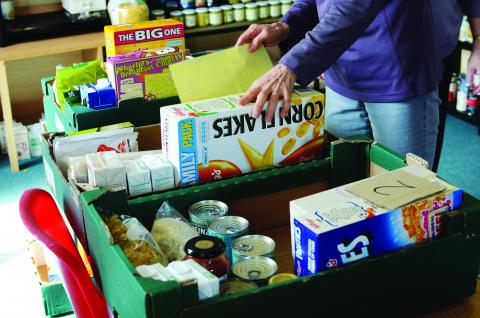15 February 2023
Food Prices Tracker: February 2023

by Josh Day
How are food prices changing?
Food inflation hits 16.7% according to Government data
The ONS has reported that food price inflation was one of the largest contributing factors to general inflation. Food inflation is remaining high at 16.7% compared to last month's 16.8%. This is much higher than general inflation which is currently at 10.1%. Although inflation may begin to fall it does not mean that the cost of food will decrease, instead, it represents a slower increase in prices.
The cost of The Food Foundation’s Basic Basket has increased by approximately 17- 22% since March 2022
The Food Foundation’s Basic Basket is a shopping basket tracker to measure weekly price changes in what the average man and woman could typically eat as part of a reasonably costed, adequately nutritious diet (see FAQs for further details). The Food Foundation has been tracking the cost of the Basic Basket since March 2022. Since then, the woman’s basket of food has increased in price by 17%, now costing £46.61 per week. The male basket has increased by 22% and currently costs £51.89 per week.
Global food prices continue to fall
Global food inflation has dropped again this month. This reduction, in large, is due to a fall in vegetable oil prices resulting from increased exports from Ukraine and Russia resulting from the Black Sea Grain Initiative. Wheat prices have also decreased for a third month in a row likely resulting, in part, from both Australia and Russia surpassing expectations for wheat production.
How is the cost-of-living crisis affecting people in the UK?
The ONS recently published a report based on the findings of their Winter Survey, providing analysis of how the autumn and winter months have impacted people’s lives. The survey indicated that pressures during the winter months were having an impact on the health and well-being of more than half of the people surveyed (53%) with 9% indicating “Not being able to afford enough food”. Further to this, 18% reported eating smaller portions, 18% reported eating food past its use by date and 15% said that over the previous 2 weeks they had been worried that food would run out before they could afford more. A higher-than-average percentage of people reported running out of food before being able to afford more among ethnic minorities, those who identified as having a disability (21%), and those in the most deprived quintile (29%). The concerning image brought into focus by the ONS’s report is one of a cost-of-living crisis having damaging effects on people across Britain and disproportionately affecting the lives of minority ethnic groups, people living with disabilities and the poorest fifth of British households.
The cost-of-living crisis and the continuing rise of food prices in the UK is also having troubling effects on children and the settings we rely on to support their care and development. In a survey of 500 childcare providers, Early Years Alliance found that rising food prices had impacted most of them, with 62% being forced to purchase cheaper ingredients, 15% reducing portion sizes for children and 9% reporting using local food redistribution services in response to the rising cost of food. The survey found that 49% of childcare providers noticed signs of food insecurity (such as children arriving to their setting hungry or children and families mentioning eating less at home) amongst some or many of the children and families they work with.
As the cost-of-living crisis continues, individuals and households who live with food allergies are being severely impacted by the accelerated price increases of alternative and free-from foods. According to analysis by The Allergy Team families with restricted diets are now paying up to 73% more for their food shops. Experts have previously suggested that those living with food allergies have faced discriminatory levels of inflation as the cost of many alternative and free-from foods increased well above the rate of inflation. As a result, many households with individuals who have food allergies are seeing significantly increased challenges in the face of the cost-of-living crisis. The Food Foundation’s 2022 Broken Plate Report found that milk alternatives are approximately 60% more expensive than dairy milk meaning that price can be a barrier for households requiring alternative and free-from foods and one that is currently being exacerbated by the current cost-of-living crisis.
The impact of the cost-of living crisis on the lives of people across the UK must not be understated. The results of many reports and surveys are making increasingly more evident the growing challenges that many individuals and households are having to face. Beyond this, we are seeing an exacerbation of the hardships disproportionately encountered by minority ethnic groups, those living with disabilities and the poorest living in the UK. As prices continue to rise it is becoming increasingly obvious that the cost-of-living crisis needs to be urgently addressed, starting with those most impacted.

Shona joined The Food Foundation as a Project Officer in 2019 and has worked on research, policy and advocacy across a range of projects over that time including leading our food insecurity surveys and flagship annual Broken Plate reports. She now works across the charity's policy portfolio including our children's food campaigns, food insecurity and food environments. She is a Registered Associate Nutritionist with a background in clinical nutrition who worked in dietetic departments in NHS hospitals before joining The Food Foundation.

Indu joined The Food Foundation in 2019 as part of the Rank Foundation’s Time to Shine scheme, moving into a Project Officer role in 2020. She works on the Peas Please and Plating up Progress projects. Prior to joining The Food Foundation, Indu completed a MSc in Public Health and a BSc in Human Nutrition. She is interested in reducing health inequalities, children’s health and wellbeing, and sustainable and nutritious food system/diets. Indu is also a lover of veg, having recently taken up urban gardening.

Josh joined The Food Foundation in 2023 as part of the Rank Foundation’s Time to Shine scheme. He completed a BA in Film Studies before continuing to study an MA in Culture and Critical Theory. Before moving to The Food Foundation Josh worked in a variety of roles in a primary school setting, utilising his experience to support the most vulnerable and disadvantaged members of the school community. Josh is interested in the impact that food systems and environments have on people's lives and is driven by a desire to ensure people have better access to a healthy and nutritious diet.





